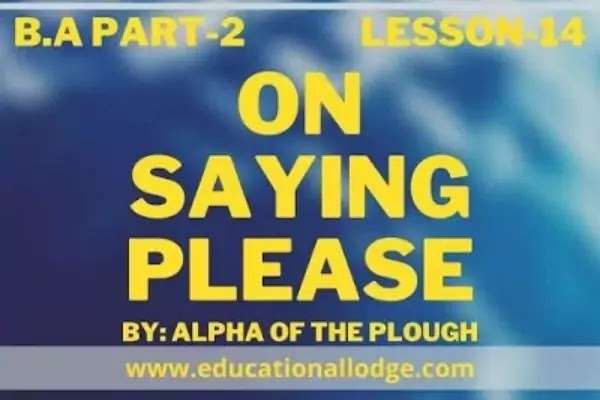


1. When did the Alpha born?
(a) 1863
(b) 1864
(c) 1864
(d) 1865
2. When did the Alpha die?
(a) 1946
(b) 1947
(c) 1948
(d) 1949
3. The real name of the Alpha of the Plough is________.
(a) Alfred Goiter Gabian
(b) Alfred George Gardiner
(c) Allein George Gardiner
(d) none of these
4. In the essay ” On Saying Please” the writer has presented the difference between moral laws and______.
(a) economy laws
(b) foreign laws
(c) religious laws
(d) legal laws
5. Whom has the writer given example as a polite man?
(a) Laborer
(b) Mason
(c) conductor
(d) mechanic
6. What did the liftman do with a man who wanted to go up?
(a) He slapped on the man’s face
(b) he threw him from the lift
(c) he abused the man
(d) he taught the man good manner
7. What happened after the man was thrown out the man from lift?
(a) he was slapped on his face
(b) He was given prize
(c) he was punished physically
(d) he was fined
8. Why did the liftman, throw the man out of the lift?
(a) The man did not say clearly
(b) the man did not say hello
(c) the man did not say. Please
(d) the man did say, Sir
9._________is not a legal offense and it does not excuse assault and betray.
(a) Dishonesty
(b) Impoliteness
(c) Discourtesy
(d) Immorality
10. I may be as uncivil as I please and the law will_______me.
(a) punish
(b) teach
(c) protect
(d) find
11. I don’t have to pay fine if I show_________.
(a) dishonesty
(b) discourtesy
(c) impoliteness
(d) immortality
12. According to the writer pain can be removed but________can not restored.
(a) Sense
(b) spiritual state
(c) self-respect
(d) none of these
13. During travel the writer could not find_________ in his pocket.
(a) mobile
(b) money
(c) purse
(d) identity card
14. Who did not charge the fare to the writer?
(a) liftman
(b) Driver
(c) conductor
(d) salesman
15. __________is the way to make the world beautiful and peaceful.
(a) discourtesy
(b) courtesy
(c) impoliteness
(d) none of these
Q 1: What does the liftman do with a man and why?
Ans: A young lift-man throws a man out of his lift for not saying “please”
Q 2: What is the punishment given to the liftman?
Ans: That young man is not punished physically but he is fined as he has committed violence.
Q 3: What is the law against discourtesy?
Ans: There’is legal Law against discourtesy. Bad manners are also based on morals, so the law does not compel anyone to say” please”.
Q 4: Can laws be bound to someone for being courteous?
Ans.‘ Although the laws protect people against violence and physical attack yet they don’t bind the people to say courteous words. So the negation of etiquette does more harm than criminal offenses.
Q 5: How the feelings are affected by harsh words?
Ans: A person may forget any physical injury but he cannot forget if his feelings are injured.
Q 6: Why are the bad and good manners infectious?
Ans: It is true that bad manners are much infectious but good manners may be infectious also. Because they pass from one person to another and influence that whole society.
Q 7: How are the little courteous words rare?
Ans: Little courteous words like “please” and “Thank you” can make our life sweet and pleasant. We can win the hearts of other people by these little courteous words.
Q 8: Whqm does the writer give an example?
Ans: The Writer Alpha gives an example of a very courteous and good-humored bus conductor, who met him in a polite manner.
Q 9: What impacts do the bad manners pour to life?
Ans: Bad manners make life sad and dull. Bad manners are as much harmful as poison. These poisonous manners are worse than all the crimes of the world.
Q 10: How do you define a courteous and polite person?
Ans: A courteous and polite man always gains spiritual and moral victory over those who are impolite.
Q 11: Who was Alpha of the Plough?
Ans: Alpha is an English journalist, biographer, and essayist. He remained Editor of “Northern Daily Telegraph”. He also joined “The Star” an essayist after splitting from ‘Northem Daily Telegraph”.
1. The liftman threw a man out of his lift because he did not say “Please”.
True
False
2. Legal systems can control bad manners.
True
False
3. The law protects against retaliation.
True
False
4. The writer tells us in detail about a “good’! conductor.
True
False
5. The “good” conduct& often stopped the bus without a station.
True
False
6. The writer’s most sensitive cat was trampled on by the”good” conductor.
True
False
7. The “good” conductor had an ease with which he got through his work.
True
False
8. “Nothing clears up my spirits like a fine day,” said Keats.
True
False
9. War has had a chilling effect upon . little everyday civilities of behavior that sweetens the general air.
True
False
10. The law can only protect us against material attack.
True
False
11. The writer tells the story of Chesterfield to the liftman
True
False
Amazing. Very helpful
👍👍👍
So informative for all of us.
..Aiza..
Will fill in the blanks nd true false also be the part of our exam?
..Aiza..
Will fill in the blanks nd true false also be the part of our exam?
..Aiza..
👍👍👍
Tremendous👌
Tremendous👌
Its Easy to learn understand nd learn as usual…😊
Mam u have added short questions here…?
Wht is their purpose?
Should we also learn them…?
Or we have just learn them as MCQs..?
Good mam
Good Material 👍
Mam plz guide Us in this Regard…?
Or we have just learn them as MCQs..?
This is really good efferot ….thanks man…
Faria
good effort mam g
Very helpful
Short questions are the part of objective paper.more you learn the data,more you will grip on the topic
Absolutely you should
Thanx dear
Ofcourse these are included in the objective paper
Helpful for students good material
Good
Helping material for students
Thanks mam
You described this lesson very well and all my confusions regarding this lesson are no more. Thanks! for the detailed and thorough quiz of this lesson.
Amazing…
Well done!
Wonderful💞this is great effort.thank you so mach mam🌺
..Razia..
Good morning mam 🌞.
Have a nice day🌹
unique description
.Kinza..
As always..
..Kinza..
💛Courtesy💛
..Kinza..
💛Courtesy💛
..Kinza..
Good work 👍👍👍👍👍👍
.. Pakiza yaqoob..
Excellent effort thanks for this great job👌👌👌👌👌👌👌👌👌👌👌👌👌💙💙💙
.. Pakiza..
This helps me alot for examz
Stay blessed…..
You're getting better everyday and doing an amazing job..
Remarkable effort!
That is so informative for us …. Amazing your effort , we should alway's appreciate you
……….THANKX…..
Muniba
I'm really sorry ma'm
I' can not any comment on this link because deformed my whatsappp …. And I'm here 🌺
I'watched, all data and I'taked sacreenshot and now I'm learn ing this data
U know those incidents or acccidents are so strong that they break u physically they deform your body but they transform your soul "…
My circumstances like this
…..Muniba….
Thanks a lot ma'm
U r a good teacher for this good job 🤭
Fantastic job😊
Keep it up Mam
Allah Bless u😊
Thanks mam g
Thankyou